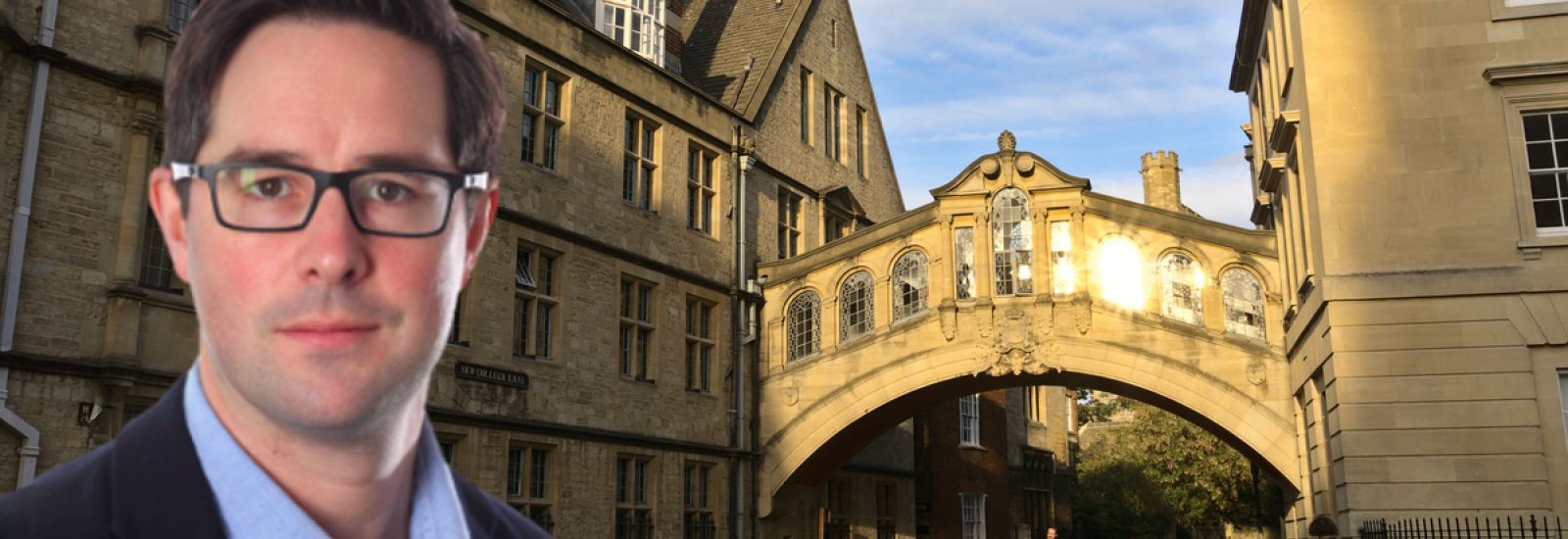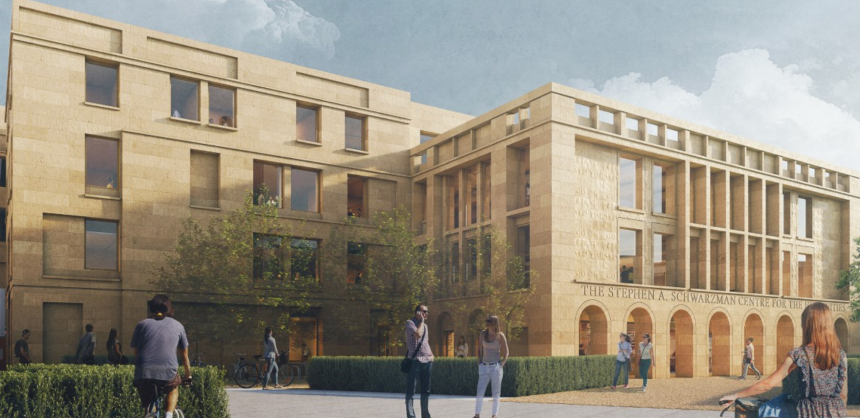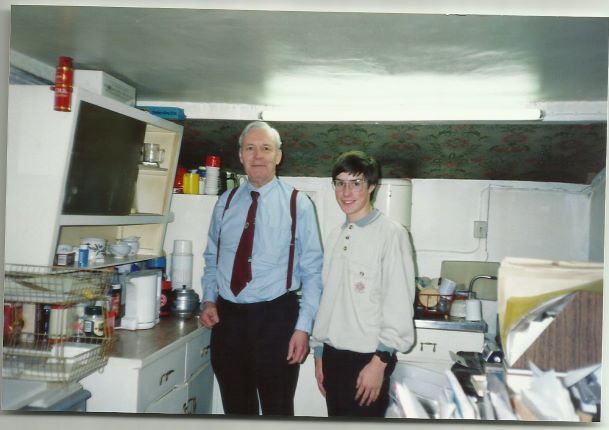
From Tony Benn intern to Oxford history professor: now William Whyte is steering a new future for universities - among other roles
Professor William Whyte has an opportunity few historians are afforded: being instrumental in the very history he researches. Happily, this does not involve dressing up in historic costume, but could well mean wearing a hard hat. For Professor Whyte is an architectural historian, specialising in churches and universities, and he has been charged with steering the creation of the Stephen A Schwarzman Centre for the Humanities - Oxford’s newest, biggest and most ambitious-ever building project, the product of a £175 million donation.
In terms of statements of intent, they do not come larger than this or receive such a very positive green light from the planning authorities. The Centre was approved unanimously last month with speeches of endorsement from all stakeholders, including local politicians and Historic England. But this is no ordinary project. The Centre is intended as a landmark in university architecture, and not just for Oxford. Professor Whyte says enthusiastically, it could transform our understanding of ‘university’ - removing the division between town and gown, exclusive and inclusive. And it is, of course, he says, with considerable emphasis, a massive endorsement for the Humanities.
The Stephen A Schwarzman Centre is intended as a landmark in university architecture....it could transform our understanding of ‘university’ - removing the division between town and gown, exclusive and inclusive...And it is, of course, says Professor Whyte...a massive endorsement for the Humanities
Historically, Professor Whyte explains, universities were all about keeping some people in and other people out. He says, ‘We’ve inherited a tradition in university architecture of a strong distinction between insiders and outsiders...we need to work more and more with the community, though. And we want people to use this building.’
But this is not just about allowing people access to a university building, which will include a concert hall and a schools space, as well as academic departments and libraries. According to Professor Whyte, it will allow more voices to enter the university space and inform debate.
‘We don’t know how important the impact will be,’ he says. ‘In a world where there is open access, what does that do, will it start rethinking what a university is?’
Universities, he explains, very much opened up in the 1870s, which led Oxford to admit a wider constituency than the sons of the upper classes and Anglican seminarians. And, Professor Whyte says, much of what is today seen as ‘Oxford’ – the ‘Bridge of Sighs’, the yellowish stone and the Exam Schools – actually date from this period. Designed by the architect Sir Thomas Graham Jackson (the subject of Professor Whyte’s first book), these renaissance-style buildings were symbols of the victory of the reformers. In the same way, he suggests, the Stephen A Schwarzman Centre will be a new departure on this evolutionary university road.
 The Stephen A Schwarzman Centre for the Humanities (artist's impression)
The Stephen A Schwarzman Centre for the Humanities (artist's impression)
But what, if any, will be the impact on scholarship?
‘It’s quite a big question for the Humanities,’ he says. ‘How do you preserve the highest possible standards while making reserved spaces available for people who are not part of the reserve?’
We don’t know how important the impact will be. In a world where there is open access, what does that do, will it start rethinking what a university is?...
Professor Whyte is clearly optimistic, ‘Everything going on in the world, [the pandemic and the war in Ukraine] demonstrates the value of the Humanities. We need history and culture, modern languages and all the other subjects.’
He adds, ‘This building will provide space where we can do new things, ask new questions and look at things in a different way. It’s very exciting....
‘This is a really important change – a symbol of the way universities are going.’
Being part of the community is key, he says, ‘People need to come...Oxford needs to be much less distant and engage with the public – exchange ideas.’
It’s quite a big question for the Humanities...How do you preserve the highest possible standards while making reserved spaces available for people who are not part of the reserve?
But this does not mean ‘dumbing down’, he insists, ‘If we believe that the Humanities are what make us human, we need to exchange knowledge and reach more people, explain complicated things. It’s not dumbing down but widening.’
Such a vision underpins Professor Whyte’s role in the Centre. He is not the project manager or the designer and is full of praise for the consultants, designers and managers who are the hands-on professionals, ‘There is an amazing team, while I’m essentially the client, representing the university.’
If we believe that the Humanities are what make us human, we need to exchange knowledge and reach more people, explain complicated things. It’s not dumbing down but widening
As such, it is his role to ensure the Centre delivers on that new vision and to say what the university wants. It is a massive task – the new Centre will be some 24,000 square metres and will include landscaped gardens, as well as all the academic and social spaces inside.
Although he is still undertaking research and has some DPhil students, the Centre will be his key work for the next three years – it is actually due to be completed on Professor Whyte’s 50th birthday (in September 2025).
Sitting in a panelled study, he may appear the quintessential Oxford history professor – and is even a Church of England clergyman, so is actually properly styled the Rev Professor Whyte. But anyone thinking he is some figure from Trollopian fiction could not be more wrong. And Professor Whyte is clearly very enthusiastic about this new (literally) ground-breaking role and - although he is far too self-effacing to say so – also about the opportunity to make a significant and potentially radical contribution to university history.
 Tony Benn with an over-enthusiastic teenager
Tony Benn with an over-enthusiastic teenagerSitting in a panelled study, he may appear the quintessential Oxford history professor – and is even a Church of England clergyman, so is actually properly styled the Rev Professor Whyte. But anyone thinking he is some figure from Trollopian fiction could not be more wrong...Appearances can be very deceptive
Appearances, of course, can be very deceptive. Born and brought up in East Suffolk – ‘not quite the middle of nowhere, but very close to it’ – Professor Whyte went to local state schools and his main interest was politics, rather than history.
His first ambition was to be a politician. He was, he says, ‘almost the sole member of the local Labour party’, although his father’s family had all been communists. And, he says with a laugh, his main claim to fame is that he once did work experience with the late Labour stalwart Tony Benn – earning him a mention in the MP’s memoirs as an ‘over-enthusiastic teenager’.
Although his school did not send many to university, he applied to Oxford, opting to take the exam, as was then possible, rather than attempting a potentially scary interview. Plus, he says, ‘If you did the exam, you could get a two Es offer.’
He opted for history, rather than PPE (Philosophy, Politics and Economics) because, he says, ‘I thought history was the way to understand the world.’
[When at school] Professor Whyte was almost the sole member of the local Labour party...and his main claim to fame, he says, is that he did work experience with the late Labour stalwart Tony Benn
And he applied to Wadham, because it seemed the most radical. He arrived at Oxford in the early 1990s and has never left, he admits with some embarrassment.
But it changed everything for the teenager. The young William decided that he actually wanted to be an historian, rather than a politician and he became interested in ‘things rather than just texts’, ‘I wanted to bring the study of other things, which are studied in ancient and medieval history, such as architecture, into the study of modern history.’
This led him to buildings and, in particular, Thomas Graham Jackson, whose portrait he had sat under in Wadham’s dining hall. Not only had Jackson been a Wadham student, he was the architect of change for the college and the university. Professor Whyte has written extensively both on university architecture – from the ancient seats of Paris and Bologna to modern contemporary campuses. One book concerns the UK’s red-brick universities – and he regrets not including a companion volume about meals.
‘Loughborough has really excellent food,’ he says earnestly. ‘If you’re ever in the area.’
Jackson’s impact on Oxford was profound, ‘His buildings are synonymous with late 19th century Oxford and he changed the colour of the university from grey to the iconic yellow of Clipsham limestone, ‘His buildings represented the triumph over the Anglican clerical reaction to reform...the university was no longer just for Anglicans.’
Having said that, Professor Whyte not only became an Anglican in Oxford, while at Wadham he was baptised in the College chapel, he became an Anglican clergyman after his doctorate and ministers in parishes each Sunday. But, as ever, things are not as conventional as it seems. Professor Whyte is married to another academic – a Holocaust historian, who is Jewish.
He laughs at a memory, ‘My father-in-law said most Jewish fathers hope for a doctor or a lawyer for their son-in-law, not a Church of England vicar.’
My father-in-law said most Jewish fathers hope for a doctor or a lawyer for their son-in-law, not a Church of England vicar
Does he have plans to convert?
‘Oh no, I am a Christian,’ says the Rev Professor in surprise.
Professor Whyte clearly relishes a busy schedule, which is just as well for someone with at least three major roles, who is also a father of young children. Typically, he worked in his rooms during lockdown – dropping the children off at their school before coming into work in an empty St John’s College.
Professor Whyte insists he is still going to be doing research and looking after his postgrads. He has another book in production and others waiting to be written. And that’s on top of the new day job, and his weekend job. So, that’s a six or is it seven day week?
By Sarah Whitebloom